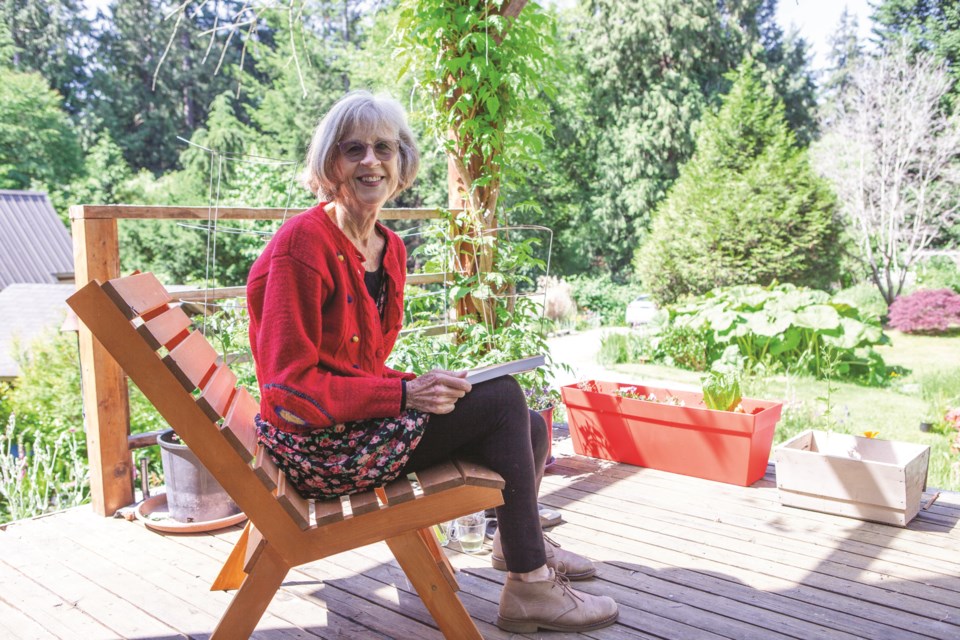The precocious heroine of Caitlin Hicks’s debut novel A Theory of Expanded Love has returned in a newly-published sequel that deftly distills American upheaval in the turbulent year 1968.
Kennedy Girl (published by Brown Posey Press) was launched by Hicks at a public reception at the Sunshine Coast Arts Centre on June 2. Only two days later marked the 55th anniversary of the assassination of presidential candidate Robert F. Kennedy. Kennedy’s campaign and murder are key influences on the teenaged existence of Hicks’s pensive protagonist, Annie Shea.
“I think I was responding to people’s desire to hear from Annie again,” said Hicks, who lives in Roberts Creek. “They were saying, oh, we really want to hear what she’s going to do and how she’s going to be.”
The contours of Annie Shea’s childhood among 14 siblings of her white Catholic military family are recounted in Hicks’s 2015 book A Theory of Expanded Love and referenced in her earlier one-woman touring play Six Palm Trees. Annie’s quicksilver voice — philosophical yet capricious — also narrates the events of Kennedy Girl.
The emotional churn of Annie’s adolescence mirrors global affairs: the Vietnam War, assassinations of Martin Luther King, Jr. and RFK, and the fight by Black Americans for civil rights. Her story is woven into each of these. A young combatant (and erstwhile love interest) drowns in a Vietnamese rice paddy. Annie enlists with the Democratic National Campaign, becoming one of the “Kennedy girls” that see the presidential hopeful with a mix of adulation and imagined familiarity. Love blossoms with a dulcet-voiced Black boy, Lucas Jones. Prejudice and resistance foment violence.
“I took some chances with the Black character because I didn’t really know what it was like to be a man that was also Black,” Hicks said. During her research she consulted extensively with a Black naval veteran and a Black woman who, like Hicks, attended Catholic school in Pasadena in the late 1960s.
“The other part of Lucas is the whole history of the Black Panthers and what they were trying to do,” she continued. “And he’s kind. Annie would be attracted to someone who was essentially kind, and yet different from her experience.”
Framing Annie’s worldview are the rituals and rhythms of Roman Catholic parish life. Clerics are by turns virtuous or vice-addled. Yet her catechism remains the scale on which intentions and actions are weighed.
“Religion encompasses your whole life and your every thought pattern,” said Hicks, who keeps a statuette of the Blessed Mother above a kitchen cabinet as a memento of her own family’s Catholic heritage. In the book, rock ‘n’ roll of the late 1960s serves as a kind of liturgy for young characters, popular culture fusing with redemption narratives.
A desperate road trip to Canada, a haven for conscientious objectors to the Vietnam draft, was part of Kennedy Girl’s plot before its first word was penned. “Annie imagines that in Canada, Christ wouldn’t even bother to be crucified,” Hicks said. “Canada’s Christ icon would be a choirmaster with his arms in the air and a look of serenity on his face.”
Loss and love intermingle until the story’s final episode. On a university campus in Berkeley, California, Annie undergoes another change on her journey to adulthood: she becomes an iconoclastic chronicler, like Hicks herself, of her generation’s momentous metamorphoses.
Kennedy Girl is available from Talewind Books in Sechelt, the EarthFair Store in Madeira Park, and online retailers.


.jpg;w=120;h=80;mode=crop)

